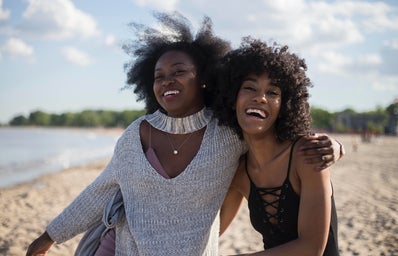Photo Courtesy: Wikimedia Commons/Genevieve
Full disclosure: Joey is 100% my favourite character on Friends, closely followed by Phoebe. (We don’t even need to ask who makes last place, right? Right.) There’s something endearing about his naïveté, something fascinating about the way he can be the absolute best friend and the absolute worst date. But as much as it would be cool to be his best friend in theory, if I ran into the Joey equivalent at a bar, or a club, or even in a coffee shop, I’d immediately run far in the opposite direction.
Here’s the thing—Joey is a player. He hits on every woman within walking distance of him with the same line, he forgets the names of the women he sleeps with, and when he first met one of his best friends, she invited him in for lemonade and he undressed completely in the 30 seconds she turned her back on him, expecting sex. Somehow, though, on T.V., he still comes across as something more than that—endearing instead of creepy, despite the fact that T.V. characters are made to be two-dimensional. The writers accomplished this with what I like to call the myth of the non-threatening man.
Men who are strangers and even men who are friends in real life generally pose some kind of threat to women, trans and non-binary people. We usually can’t tell whether they’re nice guys or creeps or assaulters at first meeting—partly because the latter two come disguised as the former more often than not. But it’s rare that we see that part of the interaction between characters like Joey and the people they’re hitting on in these comedic T.V. shows. Writers eliminate that very real component entirely, or use it only to make a joke that just skims the issue.
Not only that, but writers will give these male characters occasional feminine characteristics to subconsciously ensure the audience that they’re just not those guys—in one episode, Joey takes a liking to his female roommate’s “girl” stuff, like potpourri and pictures of babies in teacups, and in another he shows stereotypically feminine characteristics by acting hurt at the way Chandler talks to him, saying “It’s not what you said, it’s how you said it.” Though hyper-masculinity is constantly a concern of all three male characters in Friends, a frequently-used joke is the way these characters don’t conform to those standards of masculinity—Joey wears a purse, Ross loves his pink shirt, Joey and Chandler hug too much, and Chandler doesn’t actually enjoy watching the Thanksgiving football game. In including these plot points, the writers reassure the audience that these men are safe and kind and non-threats—but in a way that the audience doesn’t immediately realize. You’re left feeling like you could trust these men, but aren’t exactly sure why.
I was wondering the same as I watched New Girl recently. The premise of the whole show is that the main character, Jess, moves into an apartment with three men, Nick, Winston, and Schmidt. Already, the plot is suspicious—a woman willingly chooses to move in with not one, not two, but three men who are complete strangers to her, without another woman also living there too. Jess’ first interview with the men includes Schmidt stripping shirtless for no apparent reason and all three men ogling over the fact that Jess has a model friend, Cece, with model friends who are always visiting, But in the same episode, despite only knowing Jess for a couple hours, the men ditch the massive party they’ve been looking forward to all year to rescue Jess from one of those actually bad dudes, who stands her up because he only wanted to sleep with her. They appear to be the good guys, despite the presence of the Douchebag Jar in their apartment in which the men (mostly Schmidt) drop in money every time they say something douche-y (e.g. “Your party hats are showing” to Cece the first time they meet).
So, sure, we could suspend our disbelief and buy into a woman willingly signing up for living with three male strangers because they’ve been inconceivably kind to her. But the Schmidt problem still stands; he is a man who is genuinely, deeply saddened by the idea of Cece getting a breast reduction for her own comfort (incredibly creepy), and yet I find myself still believing he’s a fun dude and friend—as do the many women who find their way into his bedroom despite the reality of the male threat.
Schmidt’s character is unique in that he is written to be fully at ease with his own stereotypically feminine characteristics. He is obsessed with the way he dresses; he is meticulously organized, and he is openly loving to Nick and Winston in ways that sometimes make them uncomfortable. This isn’t, in and of itself, unusual; the concept of metrosexuality has been used long before New Girl, from Queer Eye (where gay men gave grooming, fashion and culture advice to straight men) to the literal British TV show named Metrosexuality. But the concept has rarely been paired with the player trope as well, mostly because audiences watching these shows within our heteronormative and patriarchal society would find it hard to believe that a man who expresses femininity could also be wildly attractive to women.
So the choice, whether intentional or not, to add occasional or frequent feminine qualities to player-type characters performs an entirely new task—to convince a female, trans and non-binary audience to love male characters that otherwise sound and look a lot like the men who have posed as threats to them in real life, and to believe that women on the show wouldn’t feel that same threat. The other option is that writers are actively attempting to destroy the stereotype that only extremely masculine and macho men can be attractive to women—but on a show like Friends where lesbianism is used as a punchline, I’m betting on the former.
There are other shows that do have threatening male characters, though whether they’re addressing them right or wrong is a different story. But it simply isn’t realistic enough to only have the threat present in obviously terrible male characters in dramatic shows. The threatening guy isn’t always the one in the black ski mask with a baseball bat in hand. Though characters like Schmidt and Joey might appear to be good guys to the audience based on what we know about their friendships and habits, to the women they’re hitting on in these shows, an ounce more of fear of what is unknown and male would make me believe them just a little bit more.


